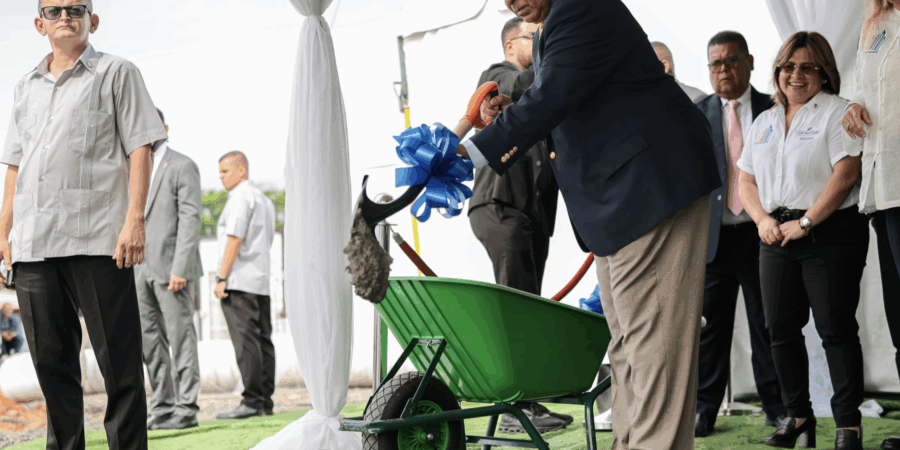The President of the Republic, José Raúl Mulino, in the company of his wife, the first lady, Maricel Cohen de Mulino; ministers of State and the director of the National Institute of Vocational Training and Training for Human Development (Inadeh), Yajaira Pittí, among other personalities, today laid the first stone of the ambitious Integral Plan of Transformation of Inadeh.
The project, located in Tocumen, contemplates the construction of buildings 1 and 2, a modern school hotel and specialized workshops. It is an investment of more than B/.65 million, co-financed by the Development Bank of Latin America and the Caribbean (CAF) and local funds, which will directly impact the lives of thousands of Panamanians.
President Mulino highlighted the immediate impact of the investment and also the benefit that a transformed Inadeh will mean for the population. Greater opportunities for all Panamanians, especially young people, which is in line with the government’s policy of articulating economic reactivation with the generation of decent jobs.
“From the first day of my administration we have been clear: our path towards economic reactivation is to generate more decent jobs. And to achieve this, we must better train our people. That is why today we take a firm step in that direction, by launching this ambitious Inadeh Transformation Plan. It is an investment that bets on our people and their future,” said the president during the protocol act, where he gave orders to proceed to the companies that will be in charge of the construction of the work.
It is estimated that the development of the project will generate more than 1,400 direct and 2,200 indirect jobs during the construction phase, of which 15% will correspond to graduates of Inadeh itself, thus reaffirming the role of the entity as an effective bridge to employment.
The new infrastructure of buildings 1 and 2, designed with the support of the UN Office for Project Services (UNOPS) as a comprehensive manager, will allow to train more than 21,000 people per year in areas such as gastronomy, hospitality, logistics, electromechanics, technology, beauty, automotive mechanics, among others, reaching more than 105,000 beneficiaries in a five-year period.
In addition, the school hotel will offer real spaces for practical training in hospitality and tourism, including rooms, restaurants, spa, barbershop, event rooms and others.
“With this project, Panama shows that it is possible to reactivate the economy by generating real jobs for Panamanians, with a vocation of service to the country. Today we sow a future and reaffirm our commitment to a country that leaves no one behind,” said the president, who showed his satisfaction with the economic indicators that point to the recovery of the national economy, and urged all Panamanians to continue to concentrate in that direction, without distraction, thinking about the country.
For her part, the general director of Inadeh, Yajaira Pittí, assured that the laying of the first stone of this comprehensive plan is more than a cement and steel project, “it is dignity, opportunity and development with equity, because in the Inadeh, a person without formal education, without resources, can train for free and have access to quality employment. And that, in a country like ours, is a powerful tool to break cycles of poverty, to close gaps and to push people towards a better life,” he said.
He stressed that this effort is in line with the Sustainable Development Goals (SDGs), since the project incorporates clean energy systems, such as solar panels and mechanisms for the collection of rainwater, with an estimated reduction of 359 tons of CO2 between 2027 and 2029, equivalent to planting more than 17,000 trees.
The transformation of Inadeh, in addition to renewing its infrastructure, will consolidate its commitment to quality technical education, inclusive and adapted to the challenges of the 21st century, Pittí reaffirmed.
This initiative represents a firm step towards the modernization of technical education in Panama and will also help generate a significant impact on the employability and sustainable development of the country, the director added.
The event was also attended by Lucía Meza, country representative of the Development Bank of Latin America and the Caribbean in Panama; Fabrizio Feliciani, regional director of UNOPS; Mayer Mizrachi, mayor of the district of Panama; deputies and representatives of corregimientos, members of the diplomatic corps and international organizations accredited in Panama, among others.
